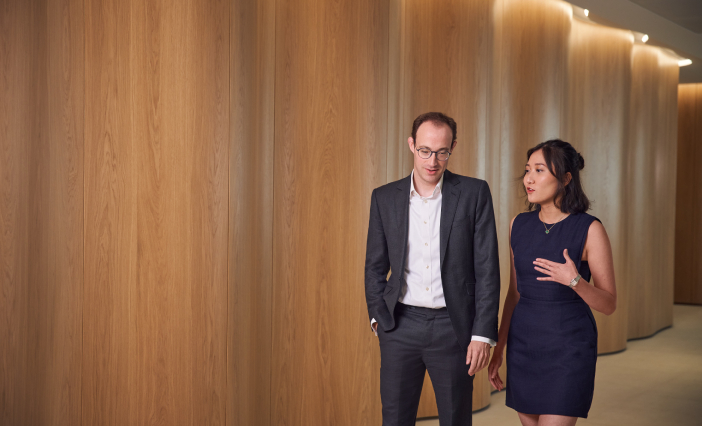
September 2024: London counsel Lachlan Low and trainee Rachel Chow explain how the trainee-supervisor relationship works, what expectations are on both sides and how future trainees can prepare to make the most of their four six-month stints working for different supervisors.
Tell us how the trainee-supervisor relationship typically works.
Rachel Chow: Your supervisor is the person who will give you work, feedback on your performance and oversee everything that you do during your six months in their team. They also tend to be the person you can approach to discuss your professional development. However, they are not the only person you work with—typically there will be associates, senior associates and partners on the team too.
Lachlan Low: Trainees are here to learn, and it's my job to make sure that they get the work and the experience they need to get the most out of their seat. I'll have different expectations of someone who's in their first seat compared to a more experienced trainee who may have done other jobs before starting their training contract, of course.
How can trainees hit the ground running when they move to a new seat?
RC: As a trainee, it's easy to feel intimidated by a new team, especially around much more experienced superiors, including your supervisor. But trainees often sit close to their supervisor while working alongside them. My advice is to get over any nervousness and make the effort to get to know them, find out about their career and learn all you can from someone you can truly see as a mentor.
At the beginning of each new seat, there is also a formal onboarding process, where you learn about the practice area, how a typical matter works and the tasks that you will likely get involved with.
LL: I always start with an introductory meeting where I ask the trainee what they want to get from the seat. I try to understand their past experiences and identify any gaps in their knowledge. It's always a good idea to ask your supervisor how they like to work. A lot of the time it's about getting the little things right - is there a particular way they like documents and memos set out, for example?
At every stage in your career, you'll have to work out how to have the best possible professional relationship with different people, both colleagues and clients. Often, that starts with a really straightforward conversation about their preferred ways of working.
As a trainee, is your supervisor your go-to for every question?
RC: Not every question – for the more administrative questions, or any work-related questions that you think you should be able to find the answer to, it's best to approach others on the team first. An associate or another trainee can probably be of help. Alternatively, I believe it's best to have done your own research first.
Chances are after having attempted to do so yourself, even if you do not arrive at a definitive response, you will have developed at least some initial thoughts on it. Thereafter, a supervisor will be happy to discuss further and your discussion will be much more fruitful as well.
LL: Trainees are here to learn, so asking questions is good and I always welcome it. I actually get more worried about trainees who do not ask questions as it usually means they don't understand what they are doing. Depending on the type of questions a trainee asks, I can get a good sense of whether the task is in safe hands or not, or whether it needs closer supervision and more direction.
The worst thing to do is to bottle up your questions or feel that you can't ask. Every supervisor was a trainee once so in my experience they are very receptive to questions. I've supervised more than 20 trainees, so I know the experience from both sides.
Is it always a one-way learning relationship?
LL: No, definitely not. There is truly no such thing as a typical White & Case lawyer, and that includes our trainees of course. Rachel had worked as a paralegal in Singapore before she joined the Firm, others come straight from university. As a supervisor you're always learning how to engage with different characters and personalities from different backgrounds to bring out the best in each trainee so that they ultimately succeed. Those trainees with whom I've developed a good working relationship will soon tell me if I'm a bit grumpy or if I've not explained something well enough!
RC: I'd like to think not! One thing I learned from Lachlan is that everything you do as a lawyer involves having strong professional relationships, and this goes both ways. While it goes without saying that Lachlan taught me loads over the course of my six-month seat, I like to believe I equally was able to offer him a different or 'fresh' perspective on things occasionally.
If you could tell future trainees one thing, what would it be?
LL: How important it is to be yourself. You're not competing with other trainees for a job, and we're not looking for one type of person – the Firm wants to hire the best people and if you do your best the Firm will try and find space for you. And make the most of it—every door is open for you when you're a trainee. Roll your sleeves up, get stuck in and be very open to helping and supporting your new team. Embrace your mistakes! It's the only way to learn.
RC: To always try your best, and as long as you've done so, you should be able to back yourself and have faith in your own capabilities. Overcome any impostor syndrome yourself! And if you are ever in need of external support or a confidence boost, remember that the fellow trainees in your cohort are more than just your colleagues, they can be amazing friends and a great support system! They're going through the same experience as you. The Early Careers team is also available to extend support whenever needed.
Any final words of advice?
LL: Aside from legal skills and experience, something that I try to instill into my trainees is the importance of striving for excellence and doing the best that you possibly can. Understand that what you're doing matters—you are a trainee but you aren't just making up the numbers. This then means that you have to take responsibility for your work and actions accordingly.
RC: Do not underestimate your role as a trainee—the Firm has made a decision to invest in your growth and development, to prepare you to take on greater responsibility in the future. Everyone starts out as a trainee, and no one is expecting you to be a 'finished product' right away.
Growth starts but never stops. Even experienced lawyers are always learning! Make sure that you are making conscious efforts to regularly reflect on what you have learnt. This is the best way to internalise the knowledge and experience you gain every day.





